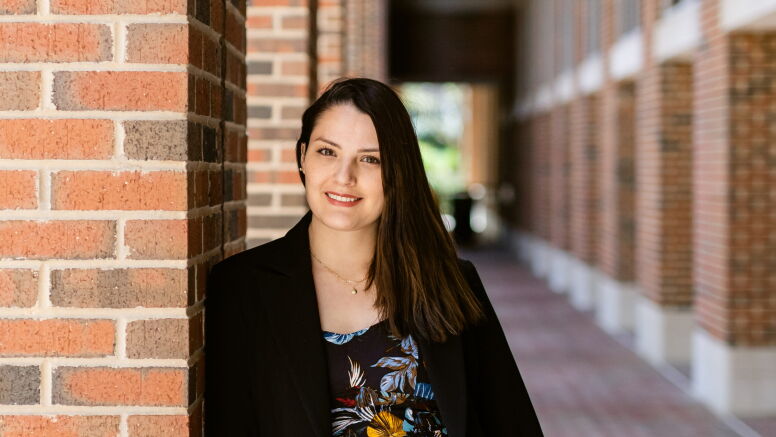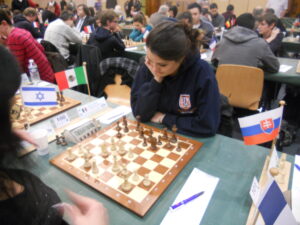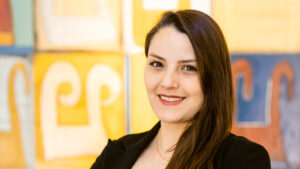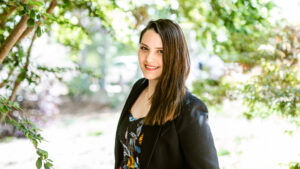News & Stories
The language of numbers

Daniela De la Parra has got game.
The accounting professor researches the linguistic choices that companies make when disclosing corporate information, and she is interested in applications of machine learning to accounting research. She is a dedicated teacher who learns all of her students’ names in the first week of classes.
 De la Parra also was a professional chess player for 12 years and holds the FIDE title of Woman International Master. She represented her native Mexico at tournaments around the world starting when she was 10 years old, when her father taught her how to play. She quickly took to the strategic aspects of the game – the calculations, creativity and logic involved.
De la Parra also was a professional chess player for 12 years and holds the FIDE title of Woman International Master. She represented her native Mexico at tournaments around the world starting when she was 10 years old, when her father taught her how to play. She quickly took to the strategic aspects of the game – the calculations, creativity and logic involved.
Her chess career changed the course of her life and eventually led her to UNC Kenan-Flagler Business School.
De la Parra won a full chess scholarship to the University of Texas at Brownsville, which is on the border of Mexico and the U.S. She double majored in accounting and finance while playing chess for the school and training with a grandmaster from Poland.
Over time, accounting won over De la Parra, and she turned more toward her studies. She eventually left the world of chess for the halls of academia.
“Chess is a big part of my life,” she says. “I see it as the one thing that really opened a door to opportunities.”
Chess originally took her to Brownsville, where she developed a passion for accounting, and her academic performance led her to Houston, where she earned her PhD degree in accounting at Rice University. When she went on the job market in 2021, UNC Kenan-Flagler quickly captured her attention.
She liked the feel of the place, the sense of community and the camaraderie she felt even though she never stepped foot on campus – because of the pandemic – until she moved to Chapel Hill to start working at the School.
Still, De la Parra was impressed from the start.
 “UNC Kenan-Flagler is very collegial, friendly and accommodating. It feels as though they have embraced and accepted me from the beginning,” says De la Parra. “It’s also a prestigious school that everyone knows. You can see the research done here is outstanding. We have talent here, recognized scholars who publish so many papers and continue publishing every month. So, it just felt like the right place for me when I interviewed, and I was right. I really do feel very lucky that I ended up in this place.”
“UNC Kenan-Flagler is very collegial, friendly and accommodating. It feels as though they have embraced and accepted me from the beginning,” says De la Parra. “It’s also a prestigious school that everyone knows. You can see the research done here is outstanding. We have talent here, recognized scholars who publish so many papers and continue publishing every month. So, it just felt like the right place for me when I interviewed, and I was right. I really do feel very lucky that I ended up in this place.”
De la Parra teaches financial accounting to undergraduates. She believes students feel empowered by the coursework.
“For me, it’s a really fun class to teach because it takes students to the beginning of accounting, all the rules of debits and credits, the way that the beautiful system of double-entry bookkeeping works,” says De la Parra. “But my students have told me that it is the first time that they really learn what’s behind the term ‘accounting,’ all the details of how the system works, and why it is important from an investor perspective to understand what’s going on behind the financial statements. How do companies come up with all this information to report and disclose?”
Learning her students’ names helps her call on them in class, strike up conversations and make them feel more comfortable speaking up.
“Maybe they’re shy to answer,” she says. “But the fact that I know their names and that I try to talk to them before and after class makes them feel a little bit more included.”
In addition to teaching class in a way that connects the dots between financial accounting and its influence on individuals and organizations, De la Parra focuses her research on better understanding the nature of financial disclosures. She studies the language that organizations use – language that can be complex, individualized and nuanced – and how it affects decision-makers.
She explains that organizations provide a wealth of information in annual reports, conference calls, and other disclosures that are not well understood. It’s hard to assess language and parse words, but it can be meaningful.
“I try to focus on what decisions companies communicate through different choices of language. For instance, do they speak in a more specific way or use more vague language? Are they trying to hide bad performance? Or do they try to highlight specific plans they have for the future with forward-looking statements? I try to also see what the impact on capital markets is. Are investors more attracted to a certain type of disclosures in one setting versus another setting?”
De la Parra is also spending time paying close attention to the audio files of conference calls.
 “It is one thing to write a message in text, but it is another thing to say it. Perhaps, the way managers speak in their conference calls communicates something else that we can parse and examine,” she says. “Maybe we will discover that the way that they’re communicating follows their personality or style. Examining unstructured datasets allows us to analyze other pieces of information that might be more nuanced or hidden in a way.”
“It is one thing to write a message in text, but it is another thing to say it. Perhaps, the way managers speak in their conference calls communicates something else that we can parse and examine,” she says. “Maybe we will discover that the way that they’re communicating follows their personality or style. Examining unstructured datasets allows us to analyze other pieces of information that might be more nuanced or hidden in a way.”
Furthermore, De la Parra has worked in the area of diversity. She recently published a paper about corporate responses to diversity issues in the aftermath of George Floyd’s murder by police officers in the Journal of Accounting Research. To start, she and her coauthors examined conference calls to determine when and how companies decided to respond to the tragedy. Many organizations discussed diversity, including equity and inclusion, social justice and racial justice. She learned that some companies needed to pay attention to their own diversity strategies or look more closely at the diversity in their corporate boards.
“So we analyze what language they use in conference calls,” she says, “but beyond that, what actions are they taking to address these issues?”
De la Parra sets herself apart by using machine learning in her research. She was among the first at UNC Kenan-Flagler to use machine learning. She was struck that the faculty embraced her interest in this new kind of research.
“They’re always looking for people who can bring something new, and can fit in with them as well. And I see that at UNC in general,” she says. “They’re accepting people for who they are and that helps to make the community stronger.”
“It feels like a family,” says De la Parra. “That sense of familiarity, that sense of community – you don’t find it everywhere.”